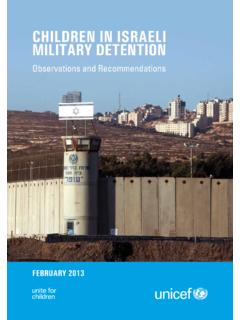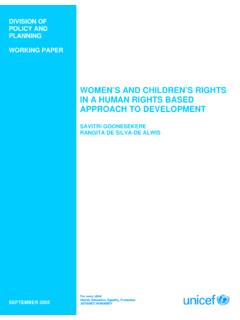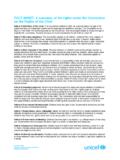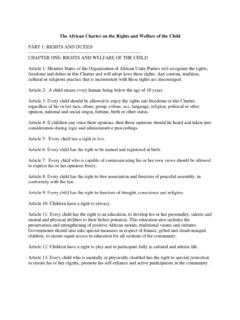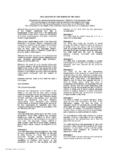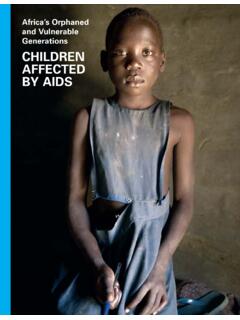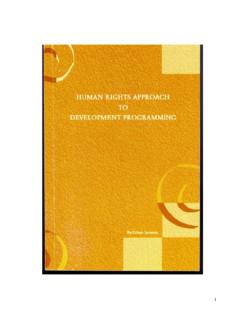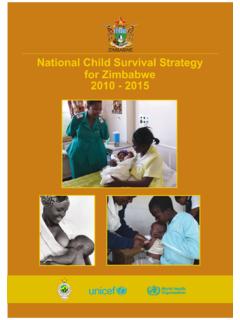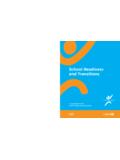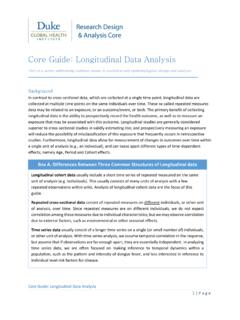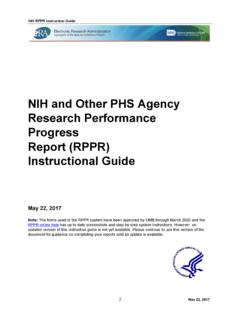Transcription of Focus group discussion guide for communities - UNICEF
1 05/03/2020 1 Focus group discussion guide for communities Risk communication and community engagement for the new coronavirus Purpose The purpose of this risk communication and community engagement guide is to help you run a Focus group discussion (FGD) with community members to find out the perceptions, questions, suggestions and rumours within the community about the new coronavirus. It is important the Red Cross and Red Crescent understands what people already know and think about the new coronavirus so we can adapt health messages and activities to better respond to the actual needs and beliefs in the community. This FGD will also help us better understand people s risk perceptions, health behaviours and practices that are being appropriate or could instead be increasing their risk of catching the new coronavirus.
2 What is a Focus group discussion ? A Focus group discussion (FGD) is a method for collecting qualitative data that gathers community individuals together to discuss a specific topic. Questions are open-ended, with the aim of stimulating an informal discussion with participants to understand their perceptions, beliefs, fears, questions and information needs with regards to the new coronavirus outbreak. An FGD will usually take around one hour and should include a minimum of 8 and a maximum of 12 participants. It is best practice to hold separate FGD s with men and women, and perhaps other minority groups too, if possible. This will motivate them to provide their opinion openly. If time does not allow for this, you can have a mixed one (half male and half female).
3 Ensure you actively include vulnerable groups such as persons with disabilities, migrants, the elderly and consider doing separate FGDs with them. FGD facilitator and note taker roles There are two roles required to conduct a successful FGD: the facilitator and the notetaker. If possible, the facilitator and notetaker should be the same sex as the participants and speak their language or local dialect (if not an interpreter is needed). The facilitator must be someone speaking the local language with good communication skills and able to make people feel at ease. In some cases when the facilitator does not speak the local language, they can work with a translator. The facilitator needs to be able to probe further based on the responses received or rephrase questions if people do not understand them.
4 They must also be able to keep participants on topic and to ensure that everyone has a chance to express themselves equally. An effective facilitator should: Be very familiar with the FGD questionnaire and COVID-19 key messages Be an active listener and demonstrate empathy with participants 05/03/2020 2 Avoid leading questions, remain neutral and do not react to participants answers in order not to bias the session Some of the questions are quite sensitive, ask them in a respectful manner and in line with the local culture The notetaker must be able to speak the local language to record the group discussion effectively.
5 As well as recording what is said during the group discussion , the notetaker should also record the behaviour of the participants (remarkable attitudes, spontaneous reactions, interactions among the participants, etc.). The notetaker should maintain confidentiality whilst recording the discussion by using letters or numbers to identify participants instead of names. The notetaker may decide to write only brief notes during the discussion but immediately after the interview, s/he should write the notes in detail so that all important information is recorded. An effective notetaker should: Have good listening and writing skills Be familiar with the list of questions and the topic of investigation Take notes in a comprehensive way but not literally Observe and remain impartial Ask, with the consent of the facilitator, a participant to repeat their answer if they do not hear it the first time.
6 A suggested seating arrangement for a group discussion Before During After Plan the objective, discussion guide , participant recruitment, consent, time and place Inform relevant community leaders/authorities that you are Introduce each other Explain who you are, the role of the Red Cross Red Crescent, our fundamental principles and the objective and duration of the FGD Ask permission to take notes and explain that confidentiality will be maintained throughout At the end, allow time for people to ask their own questions and explain again what happens with the data collected Do not make promises about what 05/03/2020 3 conducting the FGD Ensure the space is accessible, and private and participants feel safe Consider providing participants with water and snacks Test the questions of the discussion guide with a local member of the staff to make sure that they are understood.
7 And how you will use the collected data Explain participants that they can leave the FGD at any time if they feel uncomfortable Ensure informed consent (verbally) Explain clearly that participation in the FGD does not guarantee people will receive any kind of support from the Red Cross nor do people have to take part in order to receive aid Thank everyone for taking part. comes next or help people may receive Debrief together (facilitator, note taker and if applicable interpreter) and write up any additional information as soon as possible so that it is not forgotten. Question guide for an FGD with community members on the new coronavirus Community name: _____ Municipality/District: _____ Date: (DD/MM/YYYY) ____ / ____ / _____ Red Cross/Red Crescent Facilitators: _____ group name/description: _____ # of male participants: _____ # of female participants: _____ Ages represented in the group Were vulnerable groups present (elderly, disabled etc.)
8 ? _____ Introduction and consent General introduction: Good morning/afternoon, my/our name is/are_____. We work for the [National Society] Red Cross/Crescent. Do you know the Red Cross/Crescent? [If no, explain the National Society is a humanitarian organisation that helps people affected by crisis and disaster. The help we provide is always free and given based on need alone.] We are in your community to hear your opinions and views of the new coronavirus, which is also called COVID-19. We understand you may be worried about this new disease. We are here to help you understand it and make sure you know what you can do to protect yourself and others. Do you have _____ minutes to respond to participate in this discussion ?
9 05/03/2020 4 The information provided will be used by the Red Cross/Red Crescent (and potentially other responders - Government, UN agencies, NGOs) to improve the health information and activities we carry out in response to the new coronavirus. Participation in these consultations is free and there is no obligation to respond, you can stop at any point. No personal data will be shared with others and the information provided will be analysed anonymously and used confidentially. Your views are valuable and important and will contribute to ensuring our services and the information we share meets your needs. At the end of the discussion we will try to answer your own questions about the disease.
10 Since this is a new disease, we might not be able to answer all questions, but we will try our best. Our group discussion will last around ___ minutes. Do you have any questions? Are you willing to participate in the group ? 05/03/2020 5 Consent: Do you provide consent to document, use, store and share the information provided for reporting and communication purposes? YES NO (if NO, say thanks and let the person leave) May I begin now? QUESTION ANSWER KNOWLEDGE What have you heard about the new coronavirus? Please list responses including if people have not heard of it. Where and from whom did you first hear about the new coronavirus? Please list the answers.
